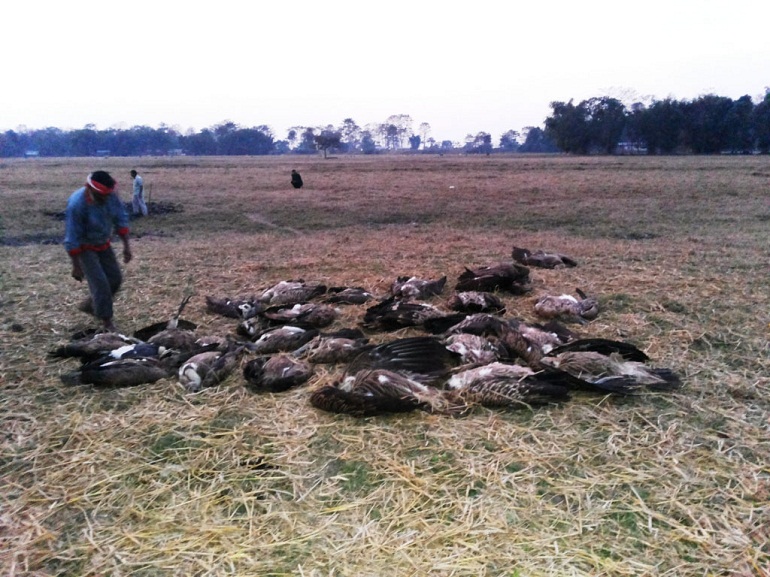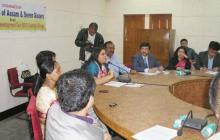A Himalayan Griffon vulture literally came back from the dead to live a new life in the wild, thanks to the never-say-die attitude of the dedicated team at the IFAW- WTI run Centre for Wildlife Rehabilitation and Conservation (CWRC).
The vulture was released along with yet another rehabilitated vulture from CWRC at Bam Rajabari village in Sivsagar , at an awareness programme in the presence of stakeholders from the village where it was found.
Barely a month ago, 50 endangered vultures were poisoned in a village in Sivsagar district of Assam, from where this solitary bird was rescued from the brink of death by the Mobile Veterinary Service (MVS) unit of CWRC that rushed to Bam-Rajabari village on 23rd January 2015.
“We were shocked to find 19 White backed vultures, 3 Slender billed vultures and 29 Himalayan griffons dead on the site. It was an acute poisoning case. Post mortem samples and two whole carcasses were sent to Regional Animal Health Center, Khanapara for further toxicological investigation and confirmatory diagnosis,” recalls Dr. Biswajit Boruah, CWRC MVS veterinarian.
Seeing the condition of the solitary bird fighting for its life, Dr. Biswajit Boruah of CWRC shifted the vulture after preliminary treatment to the rescue centre at Kaziranga for further care and investigation on 24th January 2015.
Dr. Pradip Baishya, a local government veterinarian helped the Assam Forest Department and CWRC to save this one life from a scene that shook the conservation community.
With treatment and rehabilitation at CWRC, the vulture recovered well in three weeks and was able to behave normally, which led to the decision to release the bird back to its native site by the CWRC team.
In this connection, a public awareness meeting was organised with stakeholders that included officials of the Assam Forest Department, IFAW-WTI team from CWRC, Bam Rajabari Village Committee, Village Defence Party and the villagers prior to the vulture release on site on 17th February 2015.
Suchan Ch Gogoi, ACF, Sivasagar said , “We are very happy that at least one vulture is saved and is being sent back to its home range. It is the people of Bam Rajabari who should be appreciated for their effort to conserve the vulture nests in this area. The villagers feel that vultures are their friends and need to be protected. This kind of poisoning incident should be stopped for the greater interest of this endangered species.”
Villagers showed support for vulture conservation in the awareness meeting. Pranab Kachari, VDP Secretary said, “We need to rethink for their conservation and work together to save these endangered birds.”
This unfortunate incident was the result of ill informed individuals who had poisoned a cattle carcass in the hope of eliminating stray dogs. The Assam Forest Department with the help of the Bam Rajabari Village Committee and various conservation groups have been organising vulture conservation awareness programme in the larger periphery of Bam Rajabari village for the last few years.






Add new comment